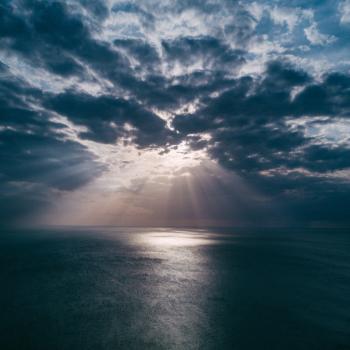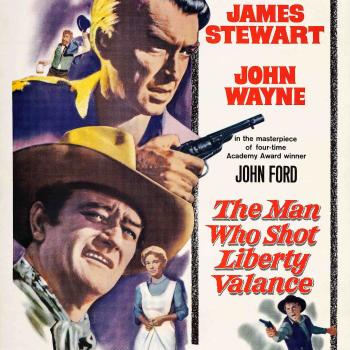A Question More Interesting Than Its Answer
Over the course of the film, Rodger's commentary offers a cluster of vague questions about the nature of the divine and, eventually, a sequence of tentative conclusions about why people believe all this stuff in the first place. Fear? Is God a policeman? A scapegoat? His discoveries, if anything, fall into the spiritual-but-not-religious sensibility that has been ascendant in popular culture for the last half-century or so. Religion, with all its tribalism and corrupt leadership, is pretty much bad. God, or spirit, and the power of individuals to decide for themselves, are good. As he crosses the border between Kenya and Tanzania, at one point, he discovers, having felt no tremendous existential shift between the two, "Boundaries are drawn by Man [he always capitalizes Man] and not by God!" Tell that to the God of Moses at Mount Nebo.
As if the nature of God weren't perplexing enough, Rodger isn't even sure that the Almighty exists. "Did Man create God, or did God create Man?" he asks in his director's statement. No scientific evidence is offered--no lab coats and barely any "experts" in the matter, besides the inevitable expertise of everyday life presented by the peculiar cast of characters. In the end, there's very little ending for me to give away. "It's up to you to come to the solution," says Rodger's narration.
"Great," you might say. "I'm just where I've started." Au contraire. This is 93 minutes of marvelously conclusive evidence that the question may be more interesting than the answer.
How about that question, anyway? That matter of "God"? Do we have to have this fixation on "God" to begin with? The idea of a single, capitalized, omni-everything divinity isn't always and everywhere. When Christian missionaries traveled the world spreading their gospel in the early modern period, they were amazed at the kinds of confusions that would arise about their assertion that something called God might exist.
Most of us assume that when you ask about God, you're asking about the person/principle who/that is the "ultimate concern" of daily existence. This isn't necessarily the case. To Aristotle, for instance, God was important, though pretty much an afterthought compared to the much more pressing matters of politics, ecology, and rhetoric. Asking him about God would be like asking Pope Benedict about the sun. He'd answer your question, but he might wonder why you bothered asking. I wonder how many of Rodger's interlocutors might have felt that way.
Worse, one could even draw out post-colonial implications, reading Oh My God as a measure of the progress that monotheism's conceptual imperialism has made around the world. Best not to go there. Bringing down the cruel weight of history on Rodger's shoulders feels unfair to his good, if also intensely vexed, intentions.
Perhaps a focal point other than "God" would have been better, something more concrete. Health? Wealth? Wisdom? We all have opinions about these things. But, after all, the filmmaker is hunting after God for a reason. It is a word with particular currency among some of the persons who appear to be screwing the world up for all of us. And it is the same word by which billions of people carry on in the hope that they might teach it, in turn, to their children's children in peace and dignity.
If Oh My God is propaganda of some kind, it is likely the kind of propaganda we need. Despite a terrible title and more eye-candy than thoughtful substance, I really hate to complain about a work that captures such a shimmering diversity of perspectives and does so in an optimistic-enough fashion to inch our species one more millionth of an inch toward lasting peace and harmony.
This article was first published at Religion Dispatches, a Patheos Partner, and is reprinted with permission.
Nathan Schneider is a writer who lives in Brooklyn, New York. He holds a master's degree in religious studies from the University of California, Santa Barbara, and a bachelor's in the same subject from Brown University. Nathan blogs at The Row Boat.




